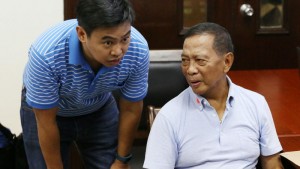Before I saw the movie I wrote: I hope the film is not full of “cinematic creativity” (read: imaginings or abuse of creative license) that, again, panders to people’s baser instincts and prejudices against other characters in our history—particularly, Gen. Emilio Aguinaldo (and, unfortunately, his descendant, Transportation Secretary Joseph E.A. Abaya of MRT infamy!). It might again be a case of “history-telling-a lie.”
The propagandists of the American colonizers are still causing division among our people. Amazing! Filipinos should by now be more discerning critical thinkers.
Tayo’y maging “mapanuri” at ’di “mapanira.” Long live the spirit of our 1896 revolution!
After seeing the movie, I say viewers must not take it as a documentary. It is fiction based on historical accounts which may not be exactly true. It is as fiction as Dan Brown’s “Da Vinci Code” is, where fact and fiction are seamlessly sewn. In “Heneral Luna” not much alteration was needed. Just a little adjustment here and there. But it is a well-crafted movie, particularly the battle scenes. The gory assassination reminds me of the artistic license taken by the producers of “The Passion of the Christ” movie. Juan Luna’s “Spoliarium” was even cleverly and artfully depicted in the death scene.
To emphasize, we should not take the film as a documentary. It’s a work of FICTION, as stated in the movie, based on historical accounts (not necessarily truths). “Heneral Luna” stirred a hornet’s nest and may have opened a can of worms. But it is a thought-provoking quality production that should challenge the youth especially to dig deeper into our history, to know and learn more from it.
Pope Francis said in his speech before the US Congress, “It is difficult to judge the past with the criteria of the present.” Why is Aguinaldo being portrayed by some as behind the tragic killing of Bonifacio and General Luna, as if this was an established fact? Is there a preponderance of evidence? I think it is more of intrigue sowed by the American colonizers to discredit him and other heroes of our revolution, to divide them for easier conquest. Think about it.
The colonizers followed the dictum: Divide and conquer! Remember, the American militarists were hard put against our ilustrado leaders like the very learned General Luna. Weren’t the American colonizers mere fighters trained to kill and conquer? It was brute force of arms against reason.
When our leaders realized the colonizers’ superiority in arms (the Americans, like the Japanese decades later, offered “co-prosperity”), our heroes considered tactical collaboration. “Ang mamatay ng dahil sa ’yo” in that situation became suicidal more than anything else. As the saying goes, “The prudent man may talk of principles but act on interest.” It may sound Machiavellian, but no doubt it saved many lives during our darkest moments.
Let’s look closely and dispassionately into our true history. Let us be proud of all of our forefathers’ heroism. They were young, learned and full of idealism. They were mostly only in their 20s and 30s when they offered and risked their lives, out of love for our motherland.
Mabuhay!
—EDGARDO J. T. TIRONA, Kawit, Cavite


